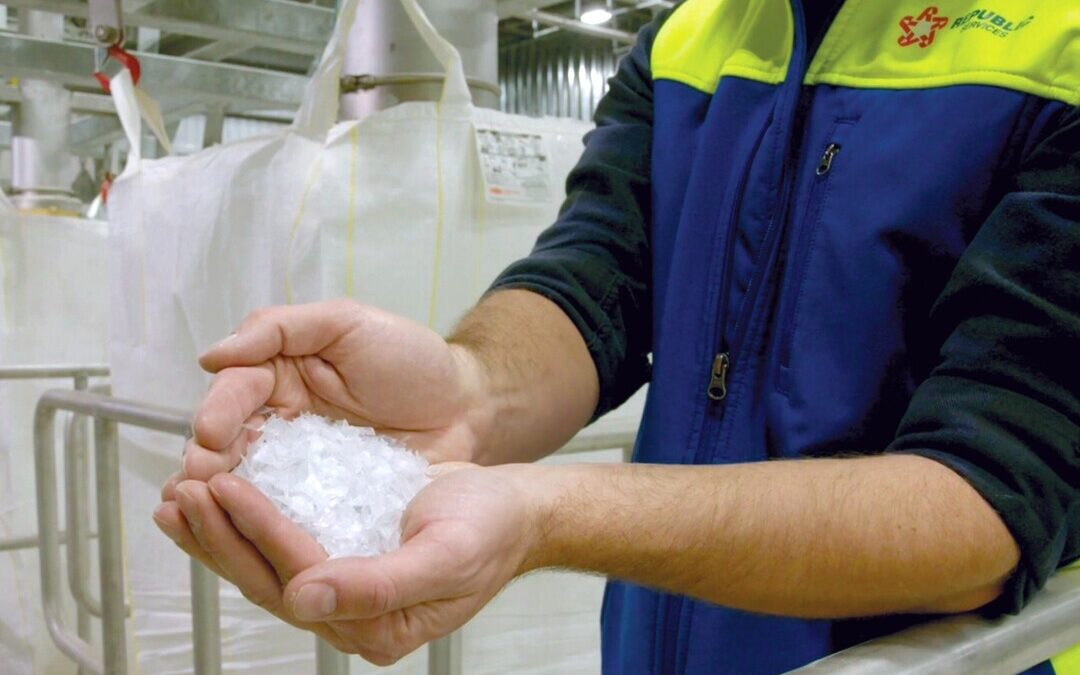Republic Services’ Recycled Plastic Flake Shows 54% Lower Carbon Footprint
US-based Republic Services boosts recycling efficiency with low-carbon rPET flake, helping brands meet sustainable packaging goals.
United States-based Republic Services Inc. announced on Tuesday that its recycled polyethylene terephthalate, or rPET, flake produced at its Las Vegas Polymer Center, has a carbon footprint 54 percent lower than that of U.S. rPET alternatives and 82 percent lower than that of virgin PET.
The findings come from an independent cradle-to-gate product carbon footprint study conducted by Sphera, a leading global provider of enterprise sustainability management software.
The study reviewed operations between January and July 2024 and compared Republic’s bottle-grade clear rPET to representative rPET from the United States and Asia, as well as virgin PET from the U.S. and India.
Stronger Circular Economy
Pete Keller, Republic’s vice president of recycling and sustainability, said the polymer centers were developed to enable bottle-to-bottle circularity and meet growing demand for high-quality recycled plastics.
“The rPET flake we produce is not only helping customers meet goals for recycled content, but also helping reduce their environmental impact,” he said.
Unlike most mechanically recycled rPET that ends up in textiles such as clothing or carpet, Republic’s flake is bottle-grade. This quality allows it to be remanufactured into new beverage bottles, reinforcing the role of recycling in building a circular economy.
Efficiency Drives Lower Emissions
The study attributes Republic’s reduced emissions to energy efficiency at the Las Vegas Polymer Center. The patented equipment line consumes less electricity and thermal energy per kilogram of flake than other recycling processes.
Additionally, the facility shares processing with other recovered materials, accounting for about 30 percent of its energy load.
The plant also benefits from a regional utility grid with a lower carbon intensity than the U.S. average or Asia’s grid mix. These combined factors significantly reduced the facility’s greenhouse gas emissions per unit of production.
Added Environmental Gains
The Las Vegas site diverts significant material from landfill or incineration. For every 1 million pounds of rPET flake produced, customers can avoid over 1.4 million pounds of plastic waste, 387,000 kilowatt-hours of energy consumption and more than 1.3 million kilograms of carbon dioxide emissions.
The polymer center also recovers non-PET materials such as colored PET, bottle caps, polyolefins and aluminum. These are reintroduced into the recycling commodities market, further boosting circularity.
Expanding Capacity Nationwide
Republic Services operates Polymer Centers in Las Vegas and Indianapolis and is building a third in Allentown, Pennsylvania. Each center is designed to produce about 120 million pounds of bottle-grade recycled plastics annually.
The company makes roughly 5 million recycling and waste pickups daily and runs 75 recycling facilities across North America. This scale allows Republic to maintain full custody of materials, from curbside collection to rPET flake production, offering greater transparency than imported rPET, which faces verification concerns.
Also Read:
Researchers Upcycle PET Plastic Into Efficient CO2 Capture Technology
Nirmal Menon
Related posts

Subscribe
Error: Contact form not found.


